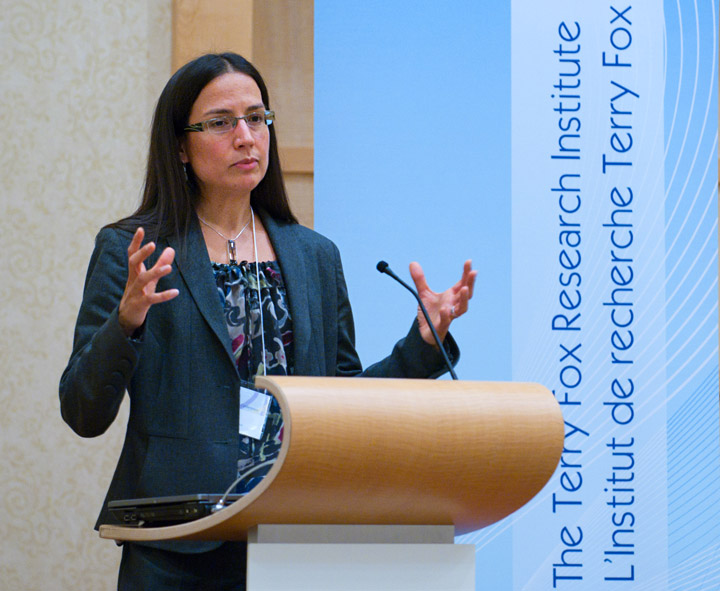
UBC assistant professor Dr. Nadine Caron, a general surgeon in the northern BC (Prince George), gave the keynote address on Dec. 1 at the first TFRI-BC Node Research Day.
More than 140 scientists, clinicians and trainees attended the afternoon session, which included talks by investigators funded under the translational, discovery and new investigator research portfolio overseen by The Terry Fox Research Institute and funded through The Terry Fox Foundation. There was also an evening poster session. Organized under the leadership of BC Node Leader Dr. Marco Marra (Genome Sciences Centre), with support from Robyn Roscoe and her team at GSC, the research day was held as an afternoon segment of the BC Cancer Agency's annual cancer conference held in Vancouver.
Dr. Caron is a member of TFRI-BC's Regional Advisory Committee and an alumna of Simon Fraser University, where both she and Terry Fox studied kinesiology. She regaled the audience with several inspiring stories about Terry - including one about the first marathon he completed in Prince George before he undertook his Marathon of Hope.
She spoke of his effect on her life. "I was nine years old when Terry dipped his foot in the [Atlantic Ocean] and I remember it very clearly. How is that for translation? I was nine and living in Kamloops and I planned to see Terry when he came through Kamloops… My mother promised me he would be there in Kamloops… and he never made it. Terry was the first person I knew who died of cancer.
"He was amazing. He could translate more than statistics and medical results… and what he translated was much bigger: passion, courage, hope, cancer research, and emotional intelligence," said Dr. Caron.
She also spoke of the challenges of delivering health care in northern regions and to marginalized populations, urging both the audience and TFRI to consider ways to ensure that individuals in these rural and remote communities are able to reach the bedside so they can benefit from bench-to-bedside advances. "The population struggles to get the care that is already out there," she explained.
She also cited a lack of access to research as a barrier for these populations, describing one patient who wanted to leave the world a better place by participating in a clinical trial, an opportunity she was never given when she underwent care for her cancer. "Stella (not her real name) wanted the opportunity to be a part of the solution," remarked Dr. Caron.
With regard to translational research, she told the gathered researchers: "Your target audience is every single person in this country and I think Terry showed us that." Translational research, she remarked, requires lots of input for it to really work.
(Dr Caron was the first aboriginal woman to graduate from the UBC Faculty of Medicine, finishing at the top of her class in 1997. She is a general and endocrine surgeon at the University Hospital of Northern B.C. and an assistant professor in UBC's Northern Medical Program.)
Taking home top honours from the evening poster session was Dr. Kevin Bennewith, BC Cancer Agency, who spoke on hypoxic tumour cells. Honourable mention went to Dr. Ali Bashashati, BC Cancer Agency, who presented a talk related to the flow informatics approaches for identification of normal and maligant stem cells project.
"We were very pleased with the strong attendance at and participation in this inaugural node day and wish to extend our sincere thanks to everyone who contributed to its success," said Dr. Marra.
The 2012 TFRI-BC Node Day will also be held as part of the annual BC Cancer Conference.